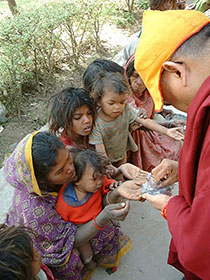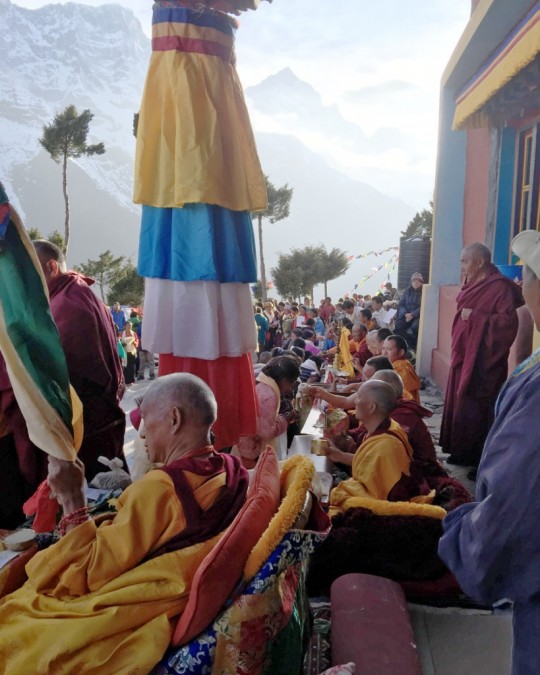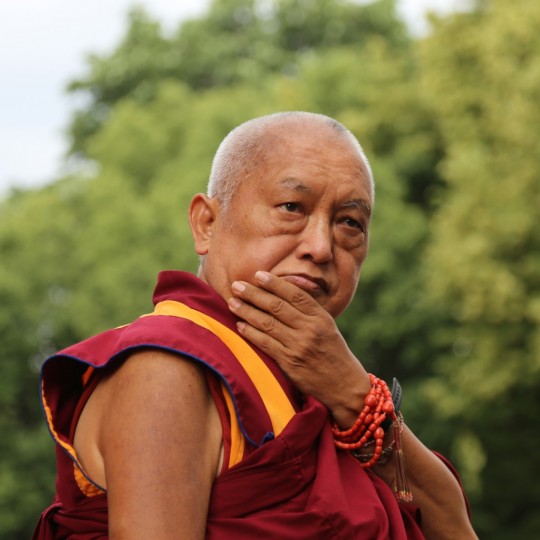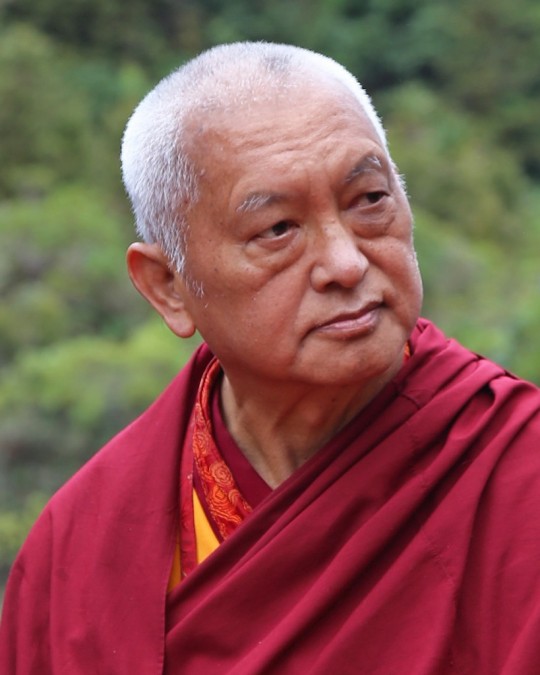- Home
- FPMT Homepage
Foundation for the Preservation of the Mahayana Tradition
The FPMT is an organization devoted to preserving and spreading Mahayana Buddhism worldwide by creating opportunities to listen, reflect, meditate, practice and actualize the unmistaken teachings of the Buddha and based on that experience spreading the Dharma to sentient beings. We provide integrated education through which people’s minds and hearts can be transformed into their highest potential for the benefit of others, inspired by an attitude of universal responsibility and service. We are committed to creating harmonious environments and helping all beings develop their full potential of infinite wisdom and compassion. Our organization is based on the Buddhist tradition of Lama Tsongkhapa of Tibet as taught to us by our founders Lama Thubten Yeshe and Lama Thubten Zopa Rinpoche.
- Willkommen
Die Stiftung zur Erhaltung der Mahayana Tradition (FPMT) ist eine Organisation, die sich weltweit für die Erhaltung und Verbreitung des Mahayana-Buddhismus einsetzt, indem sie Möglichkeiten schafft, den makellosen Lehren des Buddha zuzuhören, über sie zur reflektieren und zu meditieren und auf der Grundlage dieser Erfahrung das Dharma unter den Lebewesen zu verbreiten.
Wir bieten integrierte Schulungswege an, durch denen der Geist und das Herz der Menschen in ihr höchstes Potential verwandelt werden zum Wohl der anderen – inspiriert durch eine Haltung der universellen Verantwortung und dem Wunsch zu dienen. Wir haben uns verpflichtet, harmonische Umgebungen zu schaffen und allen Wesen zu helfen, ihr volles Potenzial unendlicher Weisheit und grenzenlosen Mitgefühls zu verwirklichen.
Unsere Organisation basiert auf der buddhistischen Tradition von Lama Tsongkhapa von Tibet, so wie sie uns von unseren Gründern Lama Thubten Yeshe und Lama Thubten Zopa Rinpoche gelehrt wird.
- Bienvenidos
La Fundación para la preservación de la tradición Mahayana (FPMT) es una organización que se dedica a preservar y difundir el budismo Mahayana en todo el mundo, creando oportunidades para escuchar, reflexionar, meditar, practicar y actualizar las enseñanzas inconfundibles de Buda y en base a esa experiencia difundir el Dharma a los seres.
Proporcionamos una educación integrada a través de la cual las mentes y los corazones de las personas se pueden transformar en su mayor potencial para el beneficio de los demás, inspirados por una actitud de responsabilidad y servicio universales. Estamos comprometidos a crear ambientes armoniosos y ayudar a todos los seres a desarrollar todo su potencial de infinita sabiduría y compasión.
Nuestra organización se basa en la tradición budista de Lama Tsongkhapa del Tíbet como nos lo enseñaron nuestros fundadores Lama Thubten Yeshe y Lama Zopa Rinpoche.
A continuación puede ver una lista de los centros y sus páginas web en su lengua preferida.
- Bienvenue
L’organisation de la FPMT a pour vocation la préservation et la diffusion du bouddhisme du mahayana dans le monde entier. Elle offre l’opportunité d’écouter, de réfléchir, de méditer, de pratiquer et de réaliser les enseignements excellents du Bouddha, pour ensuite transmettre le Dharma à tous les êtres. Nous proposons une formation intégrée grâce à laquelle le cœur et l’esprit de chacun peuvent accomplir leur potentiel le plus élevé pour le bien d’autrui, inspirés par le sens du service et une responsabilité universelle. Nous nous engageons à créer un environnement harmonieux et à aider tous les êtres à épanouir leur potentiel illimité de compassion et de sagesse. Notre organisation s’appuie sur la tradition guéloukpa de Lama Tsongkhapa du Tibet, telle qu’elle a été enseignée par nos fondateurs Lama Thoubtèn Yéshé et Lama Zopa Rinpoché.
Visitez le site de notre Editions Mahayana pour les traductions, conseils et nouvelles du Bureau international en français.
Voici une liste de centres et de leurs sites dans votre langue préférée
- Benvenuto
L’FPMT è un organizzazione il cui scopo è preservare e diffondere il Buddhismo Mahayana nel mondo, creando occasioni di ascolto, riflessione, meditazione e pratica dei perfetti insegnamenti del Buddha, al fine di attualizzare e diffondere il Dharma fra tutti gli esseri senzienti.
Offriamo un’educazione integrata, che può trasformare la mente e i cuori delle persone nel loro massimo potenziale, per il beneficio di tutti gli esseri, ispirati da un’attitudine di responsabilità universale e di servizio.
Il nostro obiettivo è quello di creare contesti armoniosi e aiutare tutti gli esseri a sviluppare in modo completo le proprie potenzialità di infinita saggezza e compassione.
La nostra organizzazione si basa sulla tradizione buddhista di Lama Tsongkhapa del Tibet, così come ci è stata insegnata dai nostri fondatori Lama Thubten Yeshe e Lama Zopa Rinpoche.
Di seguito potete trovare un elenco dei centri e dei loro siti nella lingua da voi prescelta.
- 欢迎 / 歡迎
简体中文
“护持大乘法脉基金会”( 英文简称:FPMT。全名:Foundation for the Preservation of the Mahayana Tradition) 是一个致力于护持和弘扬大乘佛法的国际佛教组织。我们提供听闻,思维,禅修,修行和实证佛陀无误教法的机会,以便让一切众生都能够享受佛法的指引和滋润。
我们全力创造和谐融洽的环境, 为人们提供解行并重的完整佛法教育,以便启发内在的环宇悲心及责任心,并开发内心所蕴藏的巨大潜能 — 无限的智慧与悲心 — 以便利益和服务一切有情。
FPMT的创办人是图腾耶喜喇嘛和喇嘛梭巴仁波切。我们所修习的是由两位上师所教导的,西藏喀巴大师的佛法传承。
繁體中文
護持大乘法脈基金會”( 英文簡稱:FPMT。全名:Found
ation for the Preservation of the Mahayana Tradition ) 是一個致力於護持和弘揚大乘佛法的國際佛教組織。我們提供聽聞, 思維,禪修,修行和實證佛陀無誤教法的機會,以便讓一切眾生都能 夠享受佛法的指引和滋潤。 我們全力創造和諧融洽的環境,
為人們提供解行並重的完整佛法教育,以便啟發內在的環宇悲心及責 任心,並開發內心所蘊藏的巨大潛能 — 無限的智慧與悲心 – – 以便利益和服務一切有情。 FPMT的創辦人是圖騰耶喜喇嘛和喇嘛梭巴仁波切。
我們所修習的是由兩位上師所教導的,西藏喀巴大師的佛法傳承。 察看道场信息:
- FPMT Homepage
- News/Media
-
- Study & Practice
-
-
- About FPMT Education Services
- Latest News
- Programs
- New to Buddhism?
- Buddhist Mind Science: Activating Your Potential
- Heart Advice for Death and Dying
- Discovering Buddhism
- Living in the Path
- Exploring Buddhism
- FPMT Basic Program
- FPMT Masters Program
- FPMT In-Depth Meditation Training
- Maitripa College
- Lotsawa Rinchen Zangpo Translator Program
- Universal Education for Compassion & Wisdom
- Online Learning Center
-
- Prayers & Practice Materials
- Overview of Prayers & Practices
- Full Catalogue of Prayers & Practice Materials
- Explore Popular Topics
- Benefiting Animals
- Chenrezig Resources
- Death & Dying Resources
- Lama Chopa (Guru Puja)
- Lama Zopa Rinpoche: Compendium of Precious Instructions
- Lama Zopa Rinpoche: Life Practice Advice
- Lama Zopa Rinpoche Practice Series
- Lamrim Resources
- Mantras
- Prayer Book Updates
- Purification Practices
- Sutras
- Thought Transformation (Lojong)
- Audio Materials
- Dharma Dates - Tibetan Calendar
- Translation Services
- Publishing Services
- Ways to Offer Support
- Prayers & Practice Materials
-
- Teachings and Advice
- Find Teachings and Advice
- Lama Zopa Rinpoche Advice Page
- Lama Zopa Rinpoche: Compendium of Precious Instructions
- Lama Zopa Rinpoche Video Teachings
- ༧སྐྱབས་རྗེ་བཟོད་པ་རིན་པོ་ཆེ་མཆོག་ནས་སྩལ་བའི་བཀའ་སློབ་བརྙན་འཕྲིན།
- Podcasts
- Lama Yeshe Wisdom Archive
- Buddhism FAQ
- Dharma for Young People
- Resources on Holy Objects
- Teachings and Advice
-
-
*If a menu item has a submenu clicking once will expand the menu clicking twice will open the page.
-
-
- Centers
-
- Teachers
-
- Projects
-
-
-
-
*If a menu item has a submenu clicking once will expand the menu clicking twice will open the page.
-
-
- FPMT
-
-
-
-
-
Letting go of attachment brings inner satisfaction and peace.
Lama Zopa Rinpoche
-
-
-
- Shop
-
-
-
The Foundation Store is FPMT’s online shop and features a vast selection of Buddhist study and practice materials written or recommended by our lineage gurus. These items include homestudy programs, prayers and practices in PDF or eBook format, materials for children, and other resources to support practitioners.
Items displayed in the shop are made available for Dharma practice and educational purposes, and never for the purpose of profiting from their sale. Please read FPMT Foundation Store Policy Regarding Dharma Items for more information.
-
-
Lama Zopa Rinpoche News
10
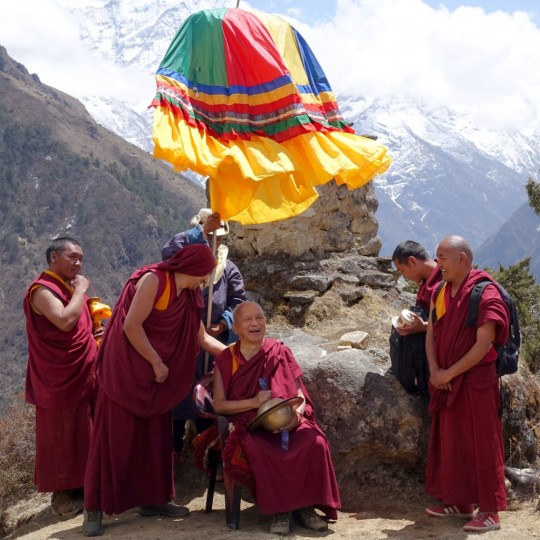
Lama Zopa Rinpoche near Lawudo Retreat Centre, Nepal, April 2015. Photo by Ven. Roger Kunsang.
“Many problems arise when our motivation is the selfish mind, concentrated in our heart,” Lama Zopa Rinpoche teaches in The Power of Compassion, a 2006 Malaysia teaching now available through the Lama Yeshe Wisdom Archive. “The main achievement is our own happiness, not others. When we do that, then there’s carelessness to others, no concern to others. Then those other people who are doing work for us become dissatisfied, they become unhappy. They don’t get treated well, they don’t get respect, then they become unhappy and they leave, or they create trouble for us. The other workers in the company or business create problems, they give harm to us, so things like that.
“Because of our selfish mind, then our actions are unkind and others become unhappy. Then we get problems, trouble. This effect is the consequence of the selfish mind. We receive the problem, but it is originally coming from our selfish mind. It becomes a circle, like that.
“Like this, the problem increases more and more. Then after some time there are court cases and people are suing each other, then you lose all the money and all these things. There are debts and all this, then the problems get built up in the life, like that. So that’s one explanation.
“Even if you become a millionaire or a billionaire, because of the selfish mind, the strong desire wanting more, better things – you want more, you want to be more rich than other wealthy people in the world – there is no ending. You engage in illegal things and many other things, then after some time, other people find out. Then all the people in the company use that to sue you. They become unhappy and sue you back. Your life ends up with a bad reputation in the world, in the newspaper, on TV. Even after you become a millionaire or a billionaire, you end up with a bad reputation and end up with life in prison.
“All these are shortcomings of the ego. This is a reality [recognized by] any religion, it doesn’t matter whichever religion it is. This is reality. Everybody can understand that.”
Find the complete The Power of Compassion on the Lama Yeshe Wisdom Archive:
https://www.lamayeshe.com/article/power-compassion
Lama Zopa Rinpoche is the spiritual director of the Foundation for the Preservation of Mahayana Tradition (FPMT), a Tibetan Buddhist organization dedicated to the transmission of the Mahayana Buddhist tradition and values worldwide through teaching, meditation and community service.
8
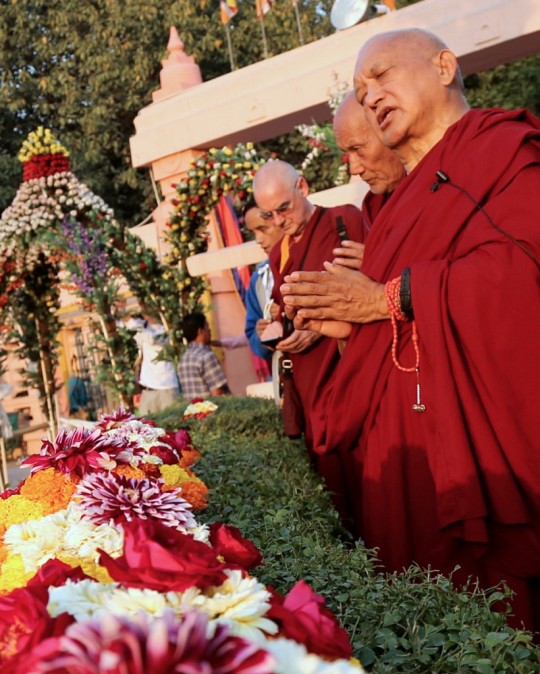
Lama Zopa Rinpoche at the Mahabodhi Stupa in Bodhgaya making offerings, February 2015. Photo by Ven. Thubten Kunsang.
In 2014, while Lama Zopa Rinpoche was celebrating Losar at Root Institute in Bodhgaya, he gave an inspiring teaching during a long life puja being offered to him. Ven. Sarah Thresher shared this report:
“… Following the tsog offering, Rinpoche took the microphone and began teaching. First he explained how important are these 15 days of Losar – the days that commemorate Buddha displaying miracles to subdue the Tirthika teachers – because at this time merit multiplies many 100 millions of times. Rinpoche commented that for ‘lazy’ people like himself, it was an opportunity to make up for all the lost time of the rest of the year when no practice was done.
“Rinpoche then continued with a beautiful talk about the qualities of Lama Yeshe and the importance of the guru. He quoted Padampa Sangye who advised, ‘Cherish the Guru more than the Buddha and realizations will come in this lifetime.’ Rinpoche described some of the obvious qualities of Lama Yeshe – his always-loving aspect that attracted everyone to him, his humility, his wisdom – and explained that Lama was known by all to be a great scholar. Rinpoche then mentioned that Lama Yeshe was also a great yogi who had the tantric realizations of clear light and illusory body but that he hid these profound practices by meditating while lying down during his regular afternoon ‘nap.’ Rinpoche said that whatever benefit the FPMT had been able to offer and however much we ourselves had been able to learn and practice, it was all due to Lama Yeshe’s kindness because it was Lama who set up the organization. …”
For more of Rinpoche’s advice for how to celebrate Losar and the 15 Days of Miracles, see a recent blog post by FPMT Education Services:
https://fpmt.org/edu-news/please-offer-lama-chopa-with-tsog-on-losar-in-honor-of-lama-yeshe/
Lama Zopa Rinpoche is the spiritual director of the Foundation for the Preservation of Mahayana Tradition (FPMT), a Tibetan Buddhist organization dedicated to the transmission of the Mahayana Buddhist tradition and values worldwide through teaching, meditation and community service.
- Tagged: lama zopa rinpoche, losar
- 0
5
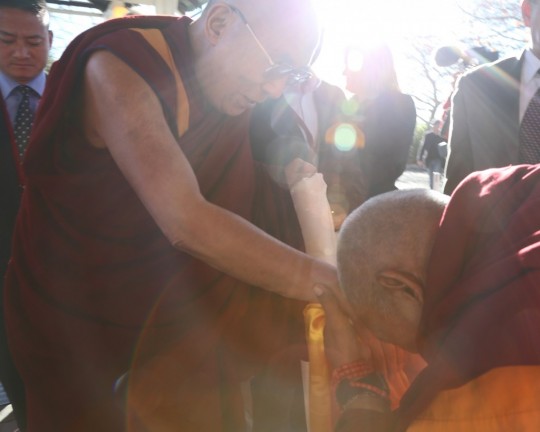
His Holiness the Dalai Lama and Lama Zopa Rinpoche, Blue Mountains, Australia, June 2015. Photo by Ven. Thubten Kunsang.
Lama Zopa Rinpoche has recently said that in order to purify our karma students can do the following practices dedicated for the health and long life of His Holiness the Dalai Lama:
- “Prayer to Guru Rinpoche to Clear Away Obstacles on the Path” (“Barche Lamsel”): the long or the short version
As many people have already been doing and continue to do the long Kshitigarbha mantra to pacify earthquakes, they can also dedicate this practice to His Holiness the Dalai Lama’s long life.
His Holiness is currently resting after receiving treatment at the Mayo Clinic in the United States. He will resume his teaching schedule in March 2016.
On February 4, His Holiness recorded a video message for Losar, Tibetan New Year. His Holiness speaks to Tibetans in Tibet and in exile as well as friends and supporters worldwide from Rochester, Minnesota, US. His Holiness speaks in Tibetan with English subtitles.
More information, photos and updates about FPMT spiritual director Lama Zopa Rinpoche can be found on Rinpoche’s webpage on FPMT.org. If you’d like to receive news of Lama Zopa Rinpoche and FPMT via email, sign up to FPMT News.
3
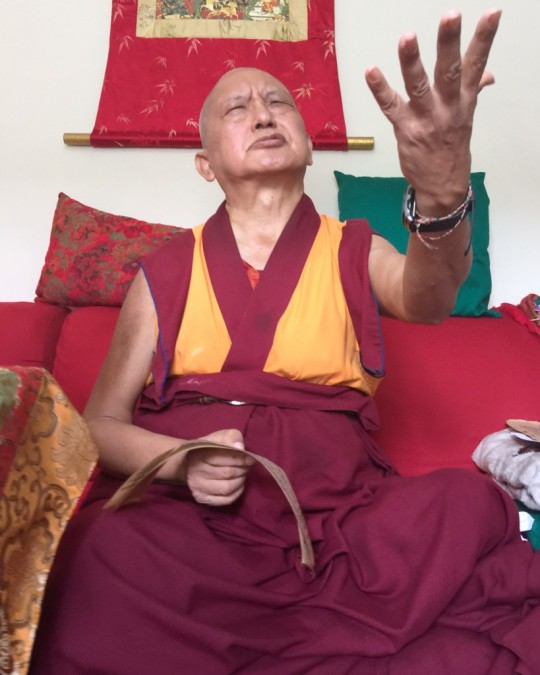
Lama Zopa Rinpoche in Brazil, September 2015. Photo by Ven. Thubten Kunsang.
“The whole life, busy with attachment and anger, is like an elephant caught in a quagmire. It cannot get out, it is completely caught in a quagmire of mud,” Lama Zopa Rinpoche taught in 2013 at Amitabha Buddhist Centre in The Path to Total Freedom, now available through the Lama Yeshe Wisdom Archive. “Life is like that, we are completely caught in the quagmire of attachment and anger, like a hallucination.
“Therefore, if we are really practicing Dharma, we can cut attachment and be totally free. As much Dharma as we practice, the less attachment is possible. Even though problems, worries and fears are not completely cut off, they become much less in our life. Therefore, there is much peace in our heart; there is great peace, because we are living our life in Dharma without attachment. Even when death comes, any time, we die in great peace. We have no worries, nothing.
“Before developing bodhichitta, we have to have preliminary renunciation of samsara. Before renunciation of samsara in the next life, we need renunciation to this life. The mind has to be living in Dharma, otherwise we can’t have bodhichitta. Without renunciation, we can’t have bodhichitta. We can’t jump ahead, thinking, ‘Oh, I don’t have renunciation, but I will jump.’
“Many people do meditation, but they don’t like renunciation. The more we meditate, the more we learn Dharma, the more we see our suffering, samsaric suffering, then it’s so easy to generate compassion for others, who have been suffering since beginningless rebirth just like us. The more we see our own suffering, the easier it is to develop compassion for others. It is so much easier to develop bodhichitta, so much easier to enter the Mahayana path, so much easier to achieve enlightenment for sentient beings, so much easier to enlighten sentient beings.”
Find the complete The Path to Total Freedom on the Lama Yeshe Wisdom Archive:
https://www.lamayeshe.com/article/path-total-freedom
Lama Zopa Rinpoche is the spiritual director of the Foundation for the Preservation of Mahayana Tradition (FPMT), a Tibetan Buddhist organization dedicated to the transmission of the Mahayana Buddhist tradition and values worldwide through teaching, meditation and community service.
2
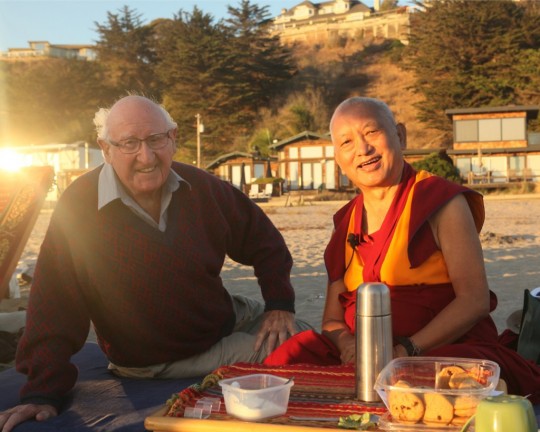
Lama Zopa Rinpoche with Richard, the father of long-time FPMT student Pam Cayton, California, October 2015. Photo by Ven. Roger Kunsang. Rinpoche and students were on the beach to bless all of the beings in the ocean.
“A good parenting plan comes from having a healthy, positive motivation for bringing up your children, one that is based on a good heart rather than on attachment. If you have a good heart and a good attitude toward life, and consequently try to do positive things to help others in your daily life, it will have a strong impact on your children,” Lama Zopa Rinpoche teaches in Joyful Parents, Successful Children, a new publication from Amitabha Buddhist Centre in Singapore, now available through the Lama Yeshe Wisdom Archive.
“It will be of great benefit to them and they will grow up with a healthy mind—a positive, pure Dharma mind. With this type of mind, they won’t harm themselves, nor will they harm other sentient beings: their families, neighbors, fellow countrymen and the people of the world, not to mention animals. Not only that, their healthy minds will also make it possible for them to bring peace and happiness to others.
“Children learn from their parents, so if they see you trying to benefit others, they will receive a positive message from your example. Then, when your children have their own children, they will pass on that same education by also living their lives with a good heart and helping others. Your children will be an example for their own children, that is, for your grandchildren. Like this, parents can help to transmit from generation to generation the importance of a good heart, of not causing harm to others and of doing as many positive actions as possible. If you do this, the result will not only be an enjoyable family life for you and your children, but it will also bring much happiness and peace to the sentient beings of this world, life after life. Therefore, your role as a parent is extremely important and entails a truly big responsibility.”
Find the complete Joyful Parents, Successful Children on the Lama Yeshe Wisdom Archive:
https://www.lamayeshe.com/article/joyful-parents-successful-children
Lama Zopa Rinpoche is the spiritual director of the Foundation for the Preservation of Mahayana Tradition (FPMT), a Tibetan Buddhist organization dedicated to the transmission of the Mahayana Buddhist tradition and values worldwide through teaching, meditation and community service.
1
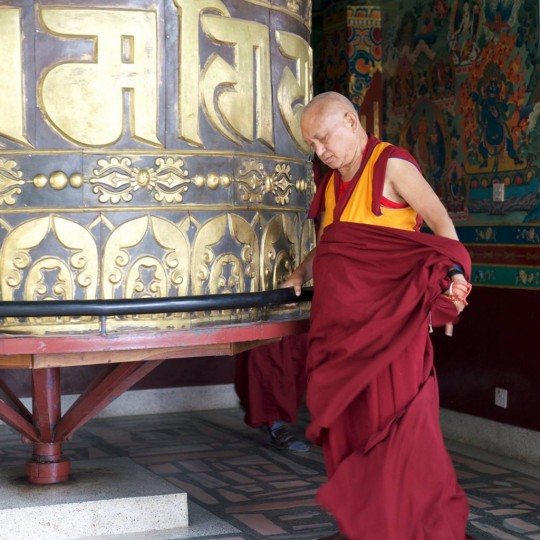
Lama Zopa Rinpoche turning the large prayer wheel at Kopan Monastery, Nepal, November 2015. Photo by Bill Kane.
“Who helps us to develop this incredible, priceless quality within us, this patience, this compassion, this priceless quality within us? Who helps us to develop this, to generate this, and to give peace and happiness to all living beings?” Lama Zopa Rinpoche asks in The Power of Compassion, a 2006 Malaysia teaching now available through the Lama Yeshe Wisdom Archive. “It is this person who has anger toward us, who abuses us, who harms us.
“This person gives us the opportunity and helps us to generate this priceless quality in the mind, thus we can offer all this peace and happiness to numberless other living beings from life to life.
“Therefore this person is so precious, unbelievably precious. There are no words to thank him for that, no words to thank him. He is precious.
“Without talking about the life after this, just in this life we can offer so much peace and happiness with patience and compassion, to our family and the country and whole world. We can bring so much peace and happiness. We can bring that to them. That’s unbelievable. That’s accomplishing our purpose in life. That’s the real meaning of life, it makes the life so worthwhile.
“That’s by the kindness of this person who has anger to us, who harms us. Because of this person’s anger and the action of harming us, this gives us the opportunity to train our mind, to practice patience and compassion. So we’re able to offer so much peace and happiness to the world, to numberless living beings, and we see this as so kind, so precious.
“We can see that even for nonbelievers – without believing in reincarnation or karma or the life after this – we can see the kindness of that person.”
Find the complete The Power of Compassion on the Lama Yeshe Wisdom Archive:
https://www.lamayeshe.com/article/power-compassion
Lama Zopa Rinpoche is the spiritual director of the Foundation for the Preservation of Mahayana Tradition (FPMT), a Tibetan Buddhist organization dedicated to the transmission of the Mahayana Buddhist tradition and values worldwide through teaching, meditation and community service.
29
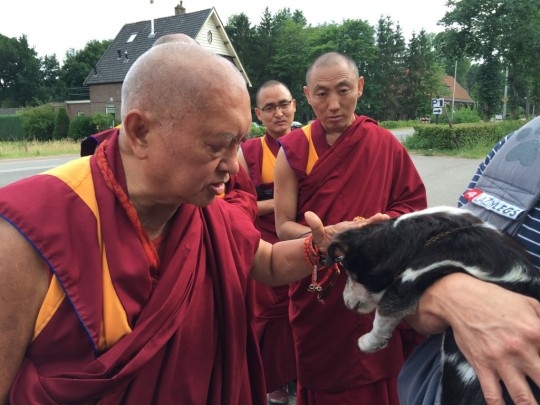
Lama Zopa Rinpoche blessing a Dutch student’s 17-year-old dog, the Netherlands, July 2015. Photo by Ven. Thubten Kunsang.
“In order to develop compassion for all living beings, we need to understand all the sufferings of all the different beings in samsara, their different types of sufferings,” Lama Zopa Rinpoche taught in “Not One Single Difficulty to Work for Other Sentient Beings” published in Lama Yeshe Wisdom Archive’s January 2016 e-letter. “So we have to meditate that it is all in the nature of suffering. Then we can develop compassion for every living being. Otherwise our compassion is very limited.
“Our compassion is limited if it’s only for poor people, only for sick people, only for human beings who are dying. Therefore we need to learn the different types of sufferings. We need to meditate on that and then we feel it is unbearable for ourselves to experience those sufferings. When that happens to us, then we feel compassion for others.
“For example, when we have AIDS, then we will feel compassion for other people who have AIDS. We feel that is so unbearable. People who have AIDS, they feel it is so unbearable that other people have AIDS. That’s because they have AIDS and they don’t want to experience that, they know about the life with AIDS.
“That’s why in the stages of the path, first we have to have the realization, renunciation of samsara. Then we see the unbearable suffering of others. Then there, compassion arises. After that, great compassion, feeling how unbearable other sentient beings’ suffering is, and taking responsibility on ourselves, that we want to free them from all the suffering. That’s how compassion arises.
“That leads to bodhichitta, taking responsibility, thinking, ‘I will do it by myself alone. I will free the sentient beings from all the suffering and causes, and bring them to ultimate happiness. Not just temporary, but ultimate happiness, especially the highest, the ultimate happiness, enlightenment. Therefore I need to be enlightened.’ The bodhichitta arises like that.”
You can read Lama Yeshe Wisdom Archive’s January 2016 e-letter to find more teachings from Lama Zopa Rinpoche:
https://www.lamayeshe.com/article/e-letter-no-151-january-2016
Lama Zopa Rinpoche is the spiritual director of the Foundation for the Preservation of Mahayana Tradition (FPMT), a Tibetan Buddhist organization dedicated to the transmission of the Mahayana Buddhist tradition and values worldwide through teaching, meditation and community service.
28
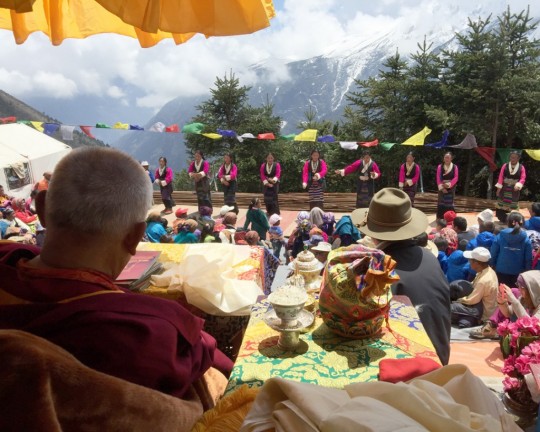
Lama Zopa Rinpoche during long life initiation, Lawudo Retreat Centre, Nepal, April 2015. Photo by Ven. Roger Kunsang.
In early April 2015, Lama Zopa Rinpoche visited Lawudo, near Mount Everest in Nepal’s Solu Khumbu region. During the visit, Rinpoche was able to spend time with the Sherpas who live there. On April 21, 2015, Rinpoche gave the Amitabha long life initiation, which was attended by hundreds of Sherpas. Long-time student Bill Kane recorded video of the traditional dances and singing offered before the initiation.
Watch the Video: Lama Zopa Rinpoche | Ancient Sherpa Dances | April 2015
The Solu Khumbu region of Nepal is home to the Sherpa people, Lawudo Retreat Centre and Lama Zopa Rinpoche, whose previous incarnation Lawudo Lama Kunsang Yeshe meditated in a cave at Lawudo for 20 years. Rinpoche’s previous visit to Lawudo was in 2008.
Rinpoche spent three weeks in Lawudo in April 2015, leaving the area on the day before the devastating April 25 earthquake. Many buildings at Lawudo Retreat Centre were damaged. FPMT’s Nepal Earthquake Support Fund offered emergency aid to the people in the upper Solu Khumbu region and is supporting the rebuilding and repairs at the center.
Lama Zopa Rinpoche is the spiritual director of the Foundation for the Preservation of Mahayana Tradition (FPMT), a Tibetan Buddhist organization dedicated to the transmission of the Mahayana Buddhist tradition and values worldwide through teaching, meditation and community service.
- Tagged: lama zopa rinpoche, lawudo
- 0
27
“Since Buddhist should give even the animals in their care a special life, there is no question that they should do this for their children,” Lama Zopa Rinpoche teaches in Joyful Parents, Successful Children, a new publication from Amitabha Buddhist Centre in Singapore, now available through the Lama Yeshe Wisdom Archive.
“However, while I know of some Buddhist parents who try to set an example for their children and explain the Dharma to them, I know many others who do not. Instead they let their children do whatever they want. This is a pity because when children are young, before they grow up and leave home, there are so many opportunities to help them collect merit and to give them an education that will plant the seeds of enlightenment in their minds.
“Of course, there is no guarantee that you will success in helping your children because, as I mentioned before, children have their own karma that they bring with them from past lives. Some children will turn out well, and as teenagers, will be disciplined, compassionate and content. Others, because of the influence of the world and their friends, will become distant from the Dharma and will have a totally different life from what their parents hoped for them.
“While your children are young, to not use the opportunity to plant the seeds of good habits would be very unfortunate. By saying this, I am not implying that you should force your children to adopt your lifestyle. Rather, I just want to emphasize that it is important to help them abandon the cause of suffering and create the causes of happiness – not only this life’s happiness but also the happiness of future lives, liberation from samsara and full enlightenment. If they learn some Dharma practices, recite some mantras and so on when they are young, even if they don’t continue with these when they get older, all the merit they collected earlier on will still cause them to meet and practice the Dharma in future lives and will bring them.”
Find the complete Joyful Parents, Successful Children on the Lama Yeshe Wisdom Archive:
https://www.lamayeshe.com/article/joyful-parents-successful-children
Lama Zopa Rinpoche is the spiritual director of the Foundation for the Preservation of Mahayana Tradition (FPMT), a Tibetan Buddhist organization dedicated to the transmission of the Mahayana Buddhist tradition and values worldwide through teaching, meditation and community service.
27
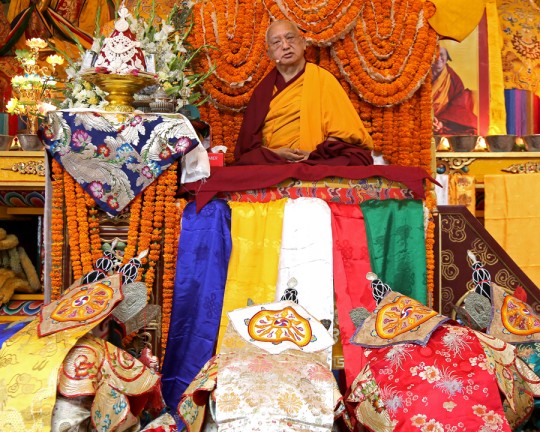
Lama Zopa Rinpoche during the long life puja offered to him at Kopan Monastery, Nepal, December 2015. Photo by Ven. Thubten Kunsang.
UPDATE: The FPMT Education Services’ booklet How to Offer a 1,000 Tsog Offerings is now available to help complete this advice.
Ven. Roger Kunsang is the assistant to Lama Zopa Rinpoche and CEO of FPMT Inc. He shares this message with the entire FPMT community:
Dear Friends,
In talking with Rinpoche recently it has become more clear regarding the importance of this long life puja we are having in Singapore at Amitabha Buddhist Centre on March 13. Rinpoche has been quite subtle, but has indicated that there are obstacles for himself this year. Rinpoche also said recently that one of the main things that will help is this long life puja in Singapore with all the FPMT centers and students participating, and prior to the puja, the 100,000 tsog offerings – this was advised by Khadro-la (Rangjung Neljorma Khadro Namsel Drönme).
Please try to be at the long life puja or participate at a distance wherever you are.
We have to continue to create the karma for Rinpoche to be with us for a long time and to purify our karma for Rinpoche not to be here. It is in our hands.
FPMT – so many students around the world – have done so much to benefit others under Rinpoche’s patient and compassionate guidance, as well as under Lama Yeshe’s compassionate guidance. We need Rinpoche to live a very long and healthy life so we can continue to benefit sentient beings as much as possible.
Sincerely,
roger
Here are the details on the long life puja in Singapore:
The official long life puja on behalf of the entire FPMT will be offered to Lama Zopa Rinpoche at Amitabha Buddhist Centre in Singapore on Sunday, March 13 as part of Rinpoche’s teaching event there. The puja will start at 9 a.m. Singapore time (GMT+8).
During the long life puja Rinpoche will be requested to give teachings on lojong (thought transformation). These teachings and the long life puja will be webcast live on FPMT’s Livestream page so that all can participate live or by video later.
How You Can Participate:
Help your local center to offer prayers and practices for the health and long life of Lama Zopa Rinpoche with a long life puja and by performing 100,000 tsog offerings with Lama Chöpa.
Donations to the Lama Zopa Rinpoche Long Life Puja Fund are welcome.
Lama Zopa Rinpoche is the spiritual director of the Foundation for the Preservation of Mahayana Tradition (FPMT), a Tibetan Buddhist organization dedicated to the transmission of the Mahayana Buddhist tradition and values worldwide through teaching, meditation and community service. For more, visit FPMT.org, where you can also find more information for FPMT centers, projects, services and study groups.
- Tagged: lama zopa rinpoche, long life puja, singapore, ven. roger kunsang
- 0
21
“[Y]ou should make sure that being together with someone becomes a cause of enlightenment by keeping in mind the motivation of bodhichitta,” Lama Zopa Rinpoche teaches in Joyful Parents, Successful Children, a new publication from Amitabha Buddhist Centre in Singapore, now available through the Lama Yeshe Wisdom Archive.
“You can use your relationship to practice morality by, for example, observing the five lay vow of abstaining from killing, stealing, adultery, lying and mind-altering substances. Likewise, having a partner provides an opportunity for you to practice the other five perfections of giving, patience, perseverance, concentration and wisdom. If you can do this, they will give you enlightenment just like your children.
“You can also think about your partner in exactly the same way as your children, ‘I have received every happiness experienced throughout beginningless lives from this person.’ Just that kindness is unimaginable, but on top of that, you also receive all your future happiness from them. In addition, you also receive liberation from every suffering, which is much more precious, from them. Then, you also receive enlightenment, which is even more precious, from that person. Thinking in this way, the conclusion is that your partner is the most precious, most dear and most kind person in your entire life.”
Find the complete Joyful Parents, Successful Children on the Lama Yeshe Wisdom Archive:
https://www.lamayeshe.com/article/joyful-parents-successful-children
Lama Zopa Rinpoche is the spiritual director of the Foundation for the Preservation of Mahayana Tradition (FPMT), a Tibetan Buddhist organization dedicated to the transmission of the Mahayana Buddhist tradition and values worldwide through teaching, meditation and community service.
- Tagged: joyful parents successful children, lama yeshe wisdom archive, lama zopa rinpoche, relationships
- 0
20
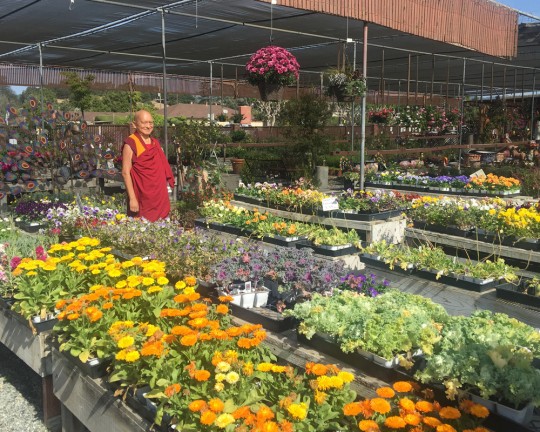
Lama Zopa Rinpoche shopping for flower offerings at a plant nursery, California, US, October 2015. Photo by Ven. Roger Kunsang.
When Rinpoche was at his home in California in October and part of November last year, he created a new flower offering card. Rinpoche then had the card made into a 3-foot (1-meter) tall sign, so that when you first enter the extensive gardens around Rinpoche’s house you read it.
This is what the card says:
Every single flower here is offered to Buddha, Dharma and Sangha, on behalf of every single sentient being in each realm, numberless hell beings, numberless hungry ghosts, numberless animals in the numberless universes, every single fish in the ocean size as large as a mountain and ones who are so small that you can only see through a machine, numberless pitiful ants, numberless pitiful mosquitos, numberless pitiful maggots, slugs, tiny crabs at the beach and so forth, every animal, numberless human beings in different universes, numberless suras and asuras to be free from the oceans of samsaric sufferings and the causes and to achieve peerless happiness, the cessation of all the obstacles and completion of all the realizations.
This means every single flower is every sentient being’s offering and this is similar with the water offerings, it is offered from every sentient being and is every sentient being’s water offering.
Thank you very much.
Rinpoche said the card could be made available to others and it could be placed where there are many flower and water offerings. (Rinpoche’s home has an incredible number of water and flower offerings.)
You can find the flower offering card in the FPMT Foundation Store:
https://shop.fpmt.org/Flower-Offering-Card–PDF_p_2550.html
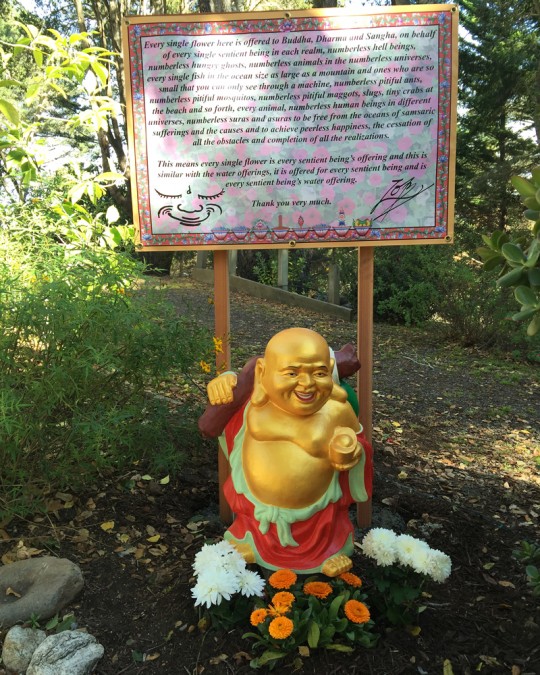
The flower offering card in the garden at Khachoe Dechen Ling, California, US, November 2015. Photo by Ven. Roger Kunsang.
More information, photos and updates about FPMT spiritual director Lama Zopa Rinpoche can be found on Rinpoche’s webpage on FPMT.org. If you’d like to receive news of Lama Zopa Rinpoche and FPMT via email, sign up to FPMT News.
- Tagged: lama zopa rinpoche, offerings
- 0
- Home
- News/Media
- Study & Practice
- About FPMT Education Services
- Latest News
- Programs
- New to Buddhism?
- Buddhist Mind Science: Activating Your Potential
- Heart Advice for Death and Dying
- Discovering Buddhism
- Living in the Path
- Exploring Buddhism
- FPMT Basic Program
- FPMT Masters Program
- FPMT In-Depth Meditation Training
- Maitripa College
- Lotsawa Rinchen Zangpo Translator Program
- Universal Education for Compassion & Wisdom
- Online Learning Center
- Prayers & Practice Materials
- Overview of Prayers & Practices
- Full Catalogue of Prayers & Practice Materials
- Explore Popular Topics
- Benefiting Animals
- Chenrezig Resources
- Death & Dying Resources
- Lama Chopa (Guru Puja)
- Lama Zopa Rinpoche: Compendium of Precious Instructions
- Lama Zopa Rinpoche: Life Practice Advice
- Lama Zopa Rinpoche Practice Series
- Lamrim Resources
- Mantras
- Prayer Book Updates
- Purification Practices
- Sutras
- Thought Transformation (Lojong)
- Audio Materials
- Dharma Dates – Tibetan Calendar
- Translation Services
- Publishing Services
- Teachings and Advice
- Find Teachings and Advice
- Lama Zopa Rinpoche Advice Page
- Lama Zopa Rinpoche: Compendium of Precious Instructions
- Lama Zopa Rinpoche Video Teachings
- ༧སྐྱབས་རྗེ་བཟོད་པ་རིན་པོ་ཆེ་མཆོག་ནས་སྩལ་བའི་བཀའ་སློབ་བརྙན་འཕྲིན།
- Podcasts
- Lama Yeshe Wisdom Archive
- Buddhism FAQ
- Dharma for Young People
- Resources on Holy Objects
- Ways to Offer Support
- Centers
- Affiliates Area
- Teachers
- Projects
- Charitable Projects
- Make a Donation
- Applying for Grants
- News about Projects
- Other Projects within FPMT
- Support International Office
- Projects Photo Galleries
- Give Where Most Needed
- FPMT
- Shop
Translate*
*powered by Google TranslateTranslation of pages on fpmt.org is performed by Google Translate, a third party service which FPMT has no control over. The service provides automated computer translations that are only an approximation of the websites' original content. The translations should not be considered exact and only used as a rough guide.We can transform any problem, even death, into happiness. The point is not to stop the experience of problems but to stop the conditions that we call ‘problems’ from disturbing our mind, and instead use them to support the spiritual path that we practice.







